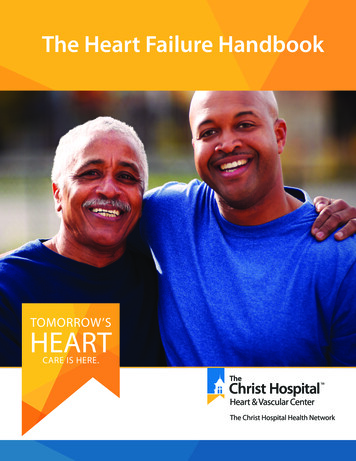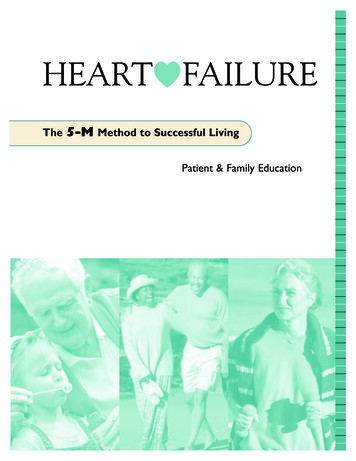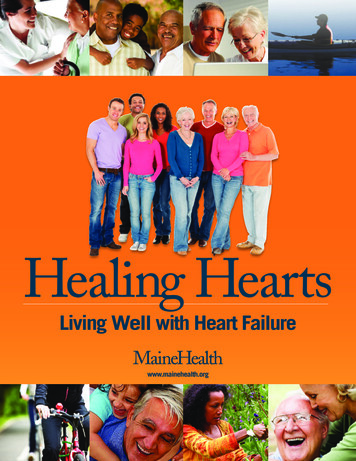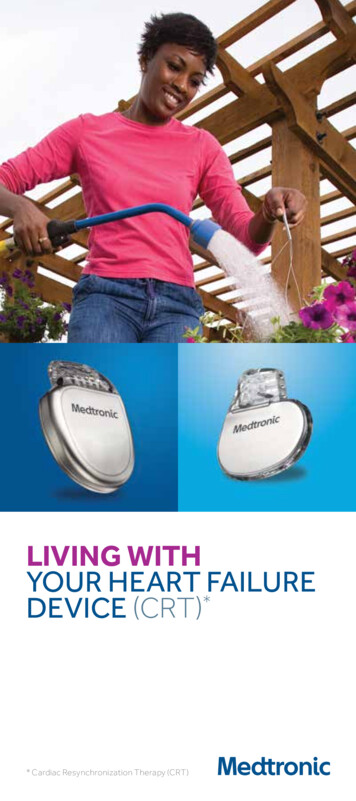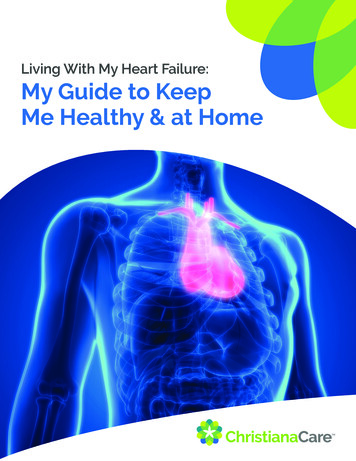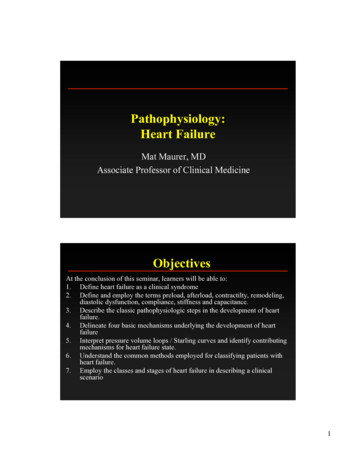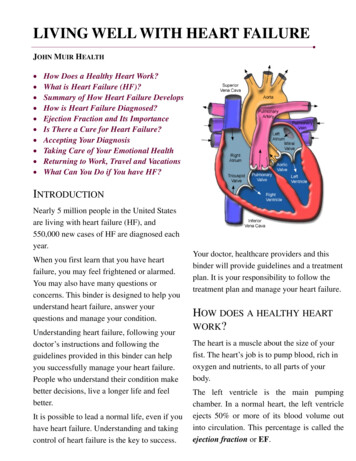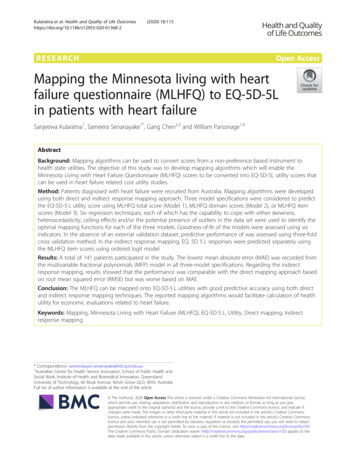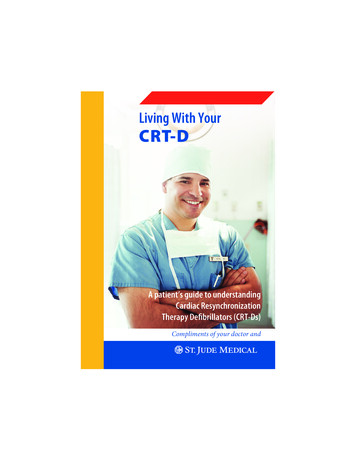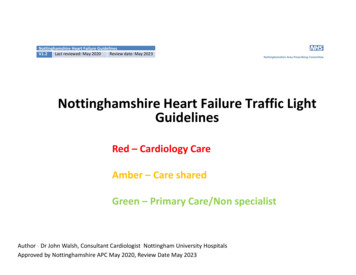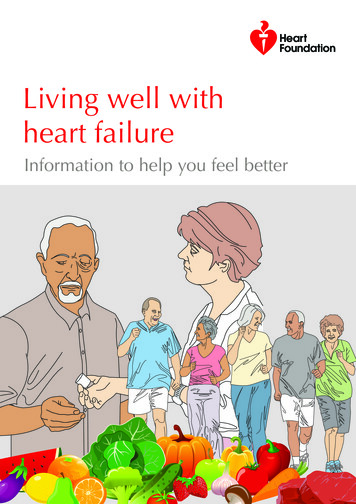
Transcription
Living well withheart failureInformation to help you feel better
AcknowledgementsWe would like to thank the heart failure team and patients at Eastern Health, Vic,and St Vincent's Health, Vic.This publication was adapted from the Heart Foundation’s resource ‘Living every daywith my heart failure’ for Aboriginal and Torres Strait Islander peoples. It was preparedby Harry Patsamanis, Clinical Strategy Advisor, and Hayley Hawkins, NationalPublications and Content Editor.This resource was supported by the Victorian Government, The Anna White Trust andthe Elizabeth & Barry Davies Charitable Foundation.Living well with heart failureNational Heart Foundation of Australia
This book is your guide to living with heart failure. It willhelp you and your family look after your heart.Your nurse, doctor or health worker can help you fill out this book.You may want a friend or family member to be with you.Name:I started this book on:My nurse is:Phone:My health worker isPhone:My family doctor (GP) is:Phone:My heart doctor (cardiologist) is:Phone:My clinic is: Phone:My pharmacist is: Phone:Family and community helpers:Name: PhoneName: Phone:Name: Phone:Many people do not just have heart failure.They may also have diabetes, kidney disease,lung problems, high blood pressure or othersicknesses.All of these sicknesses affect each otherand can be managed together.National Heart Foundation of AustraliaLiving well with heart failure1
Your heart is a muscle that pumps blood to everypart of your body. When you have heart failure,your heart muscle can become bigger, weaker, ormore stiff, and doesn’t pump as well as it should.By learning about heart failure and what to do,you can work with your doctor, nurse or healthworker to help you feel better and do more of thethings that are important to you.2Living well with heart failureNational Heart Foundation of Australia
About this bookThis book is colour coded to help you easily find informationthat can help you manage your heart failure.If you cannot understand something in this book, please talkto your nurse, doctor, health worker or the Heart FoundationHelpline (13 11 12). They are there to help you.ContentsWhat is heart failure? . . . . . . . . . . . . . . . . . . . . . . . . . . . . 4How does heart failure make you feel? . . . . . . . . . . . . . . 5What should I do when I feel sick?. . . . . . . . . . . . . . . . . 10Shortness of breath. . . . . . . . . . . . . . . . . . . . . . . . . . . . . 10Fluid . . . . . . . . . . . . . . . . . . . . . . . . . . . . . . . . . . . . . . . . 12Salt. . . . . . . . . . . . . . . . . . . . . . . . . . . . . . . . . . . . . . . . . . 20Warning signs of heart attack. . . . . . . . . . . . . . . . . . . . . 24Physical activity. . . . . . . . . . . . . . . . . . . . . . . . . . . . . . . . 25Medicines. . . . . . . . . . . . . . . . . . . . . . . . . . . . . . . . . . . . 30Heart devices . . . . . . . . . . . . . . . . . . . . . . . . . . . . . . . . . 33Things you can do to feel better. . . . . . . . . . . . . . . . . . . 34My records . . . . . . . . . . . . . . . . . . . . . . . . . . . . . . . . . . . 36Things to do every day . . . . . . . . . . . . . . . . . . . . . . . . . . 41My emergency plan . . . . . . . . . . . . . . . . . . . . . . . . . . . . 42National Heart Foundation of AustraliaLiving well with heart failure3
What is heart failure?What is heart failure?Heart failure is when your heart gets damaged, becomes bigger,weaker, or more stiff, and doesn’t pump as well as it should. Thiscauses extra fluid to build up in your body and sometimes in yourlungs.Lots of things can damage your heart including: heart attack high blood pressure too much fat in your blood (high cholesterol) too much alcohol too much sugar in your blood (diabetes) infections (virus) something you are born with some medicines (e.g. cancer therapies).Heart failure is a serious problem and help from your nurse,doctor or health worker is important. Work with them to helpimprove your heart and health. You can’t always make the heartstrong like it used to be but you can help the heart to work better.This will make it easier to do things that are important to you.Your doctor may ask you to have an echocardiogram (echo), atest that uses sound waves to create a moving picture of yourheart. The echo shows the size and shape of your heart and howwell it is pumping.Example of a damaged heart with heart failureNormal heartHeart with heart failureHeart is biggerand out of shapeHeart chambersare weakerBlood stays inthe heart longer anddoesn’t pump properlyHeart might beat fasterLess pumpedbloodLess bloodinin andand pumpedout of theheartout of the heart4Living well with heart failureNational Heart Foundation of Australia
Feeling sadFeeling dizzyFeeling tired andnot being able to sleepPain in chestHeart pounding orbeating fastStomachbloatingCoughingNauseaHard to breathe orshortness of breathLoss ofappetiteHow does heart failure make you feel?How does heart failuremake you feel?Putting onweight quicklySwollen ankles or legsNational Heart Foundation of AustraliaLiving well with heart failure5
How does heart failure make you feel?Which of these things do youworry about or notice the most?Short of breathTrouble breathingWhat can you do? Talk to your nurse, doctor or healthworker if you are more breathless thanusual or it is getting harder to do thethings you usually do without gettingout of breath. See the ‘Shortness of breath’ sectionon page 10.Swollen ankles, legs or stomachWhat can you do? Measure how much fluid you drinkeach day (all fluid, not just water). Eat less salt. Weigh yourself every day. Take your fluid tablets. Talk to your nurse, doctor or healthworker about how much fluid youshould have in a day. See the ‘Fluid’ section on page 12 andthe ‘Salt’ section on page 20.Pain in your chestWhat can you do? If you get chest pain, stop, rest and take youranginine or nitrolingual spray. If the chest pain is really bad or getsworse, call Triple Zero (000) and ask for anambulance. This is an emergency. See the section ‘Warning signs of heart attack’on page 24.6Living well with heart failureNational Heart Foundation of Australia
What can you do? Stop what you are doing and rest. Talk to your nurse, doctor or healthworker if your heart is beating fasterthan usual. There are medicines thatcan help with this.Feeling tiredAs your heart may not be pumpingblood as strongly as it should, you mayfeel tired and not be able to do thethings you usually do.What can you do? Be physically active each day tohelp your heart get stronger. See the‘Physical activity section on page 25. Take rests when you need to. Ask for help if you need it.How does heart failure make you feel? eart pounding or going tooHfast (palpitations)Feeling dizzyDizziness can be caused by low bloodpressure and some medicines.What can you do? Stop and rest. Stand up slowly when you have beensitting or lying down. If it keeps happening, talk to your nurse,doctor or health worker about how you arefeeling. They can help you.National Heart Foundation of AustraliaLiving well with heart failure7
How does heart failure make you feel?Feeling sad or worriedYou are not alone. Many peoplecan feel sad or worried about beingsick and not being able to do thethings they used to do. If you havethese feelings for two weeks ormore, it could be depression.What can you do? Talk to someone about howyou are feeling – don’t keep itto yourself. Your doctor, nurse or healthworker can help you feel better orget you the help you need. Talk tothem about it.CoughingYou may cough more at night becausethere is too much fluid in your lungs.What can you do? Take your fluid tablets. If you are coughing more often or have anew cough, talk to your nurse, doctor orhealth worker.Not hungryIf you are not hungry, you may havetoo much fluid in your stomach or youmay not be going to the toilet enough(constipated).What can you do? Eat smaller meals more often. Have snacks during the day. Eat foods you like and enjoy. Talk to your nurse, doctor or healthworker.8Living well with heart failureNational Heart Foundation of Australia
What can you do? Be physically active and move aroundmore. Drink fluids but no more than your doctorhas recommended. (remember to measurehow much you drink, see page 14). Eat more fruit and vegetables. Talk to your nurse, doctor or health workerbecause sometimes medicine can help.Which of these things do youworry about or notice the most?National Heart Foundation of AustraliaLiving well with heart failureHow does heart failure make you feel? ot going to the toilet oftenNenough (constipation)9
What should I do when I feel sick?What should I do whenI feel sick?TakeActionThere are a number of signs that will let you know when youneed help managing your heart failure. In this book, they arecalled ‘Take Action’ signs. These are also called ‘symptoms’.When symptoms or ‘Take Action’ signs worsen, you need to talkto your nurse, doctor or health worker so they can help you.Shortness of breathYou can get short of breath from heart failure, lung disease,smoking and asthma. In heart failure, being short of breath isoften the first thing you notice. It is caused by fluid in the lungs.This fluid can also make you cough and wake up at night.SleepDo you need to sit up higher to sleep?YesNo Do you sleep all night? Yes N oCan you lie flat to sleep? Yes NoDoes shortness of breath or coughing wake you up?Yes NoWalkingCan you walk as far?YesNoDo you get short of breath when you walk?Yes NoWhen I feel well, I can walk to:When I feel sick, I can only walk to:When I get short of breath, I can’t do things like:10Living well with heart failureNational Heart Foundation of Australia
Heart failure can make you feel short of breath whenyou are lying down. When it gets really bad, you mayneed to sit up to sleep. You must go to see your doctor,nurse or health worker within 24 hours if you have touse extra pillows or sit up at night to sleep.TakeActionWhat should I do when I feel sick?BadGoodImportant ‘Take Action’signs are: can’t lie down to sleepNew cough need to sit up more at nightusing extra pillows more breathless new coughchest pain not able to walk to other:National Heart Foundation of AustraliaFeeling breathlessLiving well with heart failure11
FluidFluidWhen you have heart failure, your heart doesn’t pump properlyand you get more fluid in your body. This can make you weighmore or make your ankles, legs or other parts of your body swellup. It is important to know when fluid in your body is building upso you can do something early.What you can doWrite down your weight every day and look for changes, up ordown. Using a diary or calendar may help. Weigh yourself every day. The best time to do this is in themorning after you go to the toilet, but before you get dressedand eat breakfast. Know what your ‘good’ or ‘healthy’ weight is. If you put on weight quickly, more than 2 kg in two days,call your doctor, nurse or health worker.How much do you weigh when you feel well?(This is called dry weight.)kgHow much do you weigh when you don’t feel well?kgHow do you know when you have extra fluid in yourbody (signs)?12Living well with heart failureNational Heart Foundation of Australia
FluidUsing scales that have bigdigital numbers makes iteasier to see your weightWeigh in every dayCheck to see if your weight has changedsince the last time you weighed yourself.Has your weight gone up quickly?TakeActionImportant ‘Take Action’signs are: putting on weight quickly – more than2 kgs in two daysyour belt or pants get tight swollen ankles, stomach or legsyour shoes and socks get tight loss of appetite other: National Heart Foundation of AustraliaLiving well with heart failure13
FluidTo manage your fluid, you should: talk to your nurse, doctor or health worker about how muchfluid you can have measure how much fluid you can have each day (usuallyabout 1,000–1,500 mL, or 1–1½ litres a day, but talk to yourdoctor about what is right for you) try not to have more than your daily allowance remember to count the fluid you have in other foodand drinks.You might need more when it is very hot – check with your nurse,doctor or health worker.How to measure fluids Measure how much your usual cup or glass holds and keepa record of how many you drink. You must use the same cup for each drink.OR Fill a jug with your allowance each morning and drink fromthis during the day – allow water for taking your medicines.If you get thirsty, you can: chew sugarless gum suck on a small amount of ice – remember to count thisin your daily fluid try to stay cool on hot days avoid salty foods avoid lots of sugar fill a small spray bottle with water and spray the inside ofyour mouth – remember to count this in your daily fluid.14Living well with heart failureNational Heart Foundation of Australia
FluidHow to manage your fluid intake using a jugMark on your jug to show you what yourfluid limit is. Fill up the jug to the markevery morning and use this water for yourkettle as well.When the jug is empty, you will knowthat you have reached your limit forthe day.How to manage your fluid intake using a cupMy usual cup I can haveeach day.mLcups to drinkRemember to use the same cup forall drinks.National Heart Foundation of AustraliaLiving well with heart failure15
FluidWhat do I count as fluids or drinks?Drinks that come in a can, bottle or carton will have the amountof fluid written on the label (e.g. a can of soft drink is 375 mL).Remember, fluid is more than just water (drinks). All of the thingsbelow count as fluid.SoupsWaterJuiceTea and coffeeIce-creamJellyMilk orflavoured milkAlcoholFruit with lots of water(e.g. watermelon)PastaSoft drinks16YoghurtIceCustardLiving well with heart failureNational Heart Foundation of Australia
FluidWhat is the fluid content of foods?1 tablespoon 20 mL1 metric cup 250 mL (8oz)1 litre 1000 mL 1 kg in fluid weight1 ice cube 15 mLNote: Use measuring cups and jugs to accurately measure yourfluid intake.Fluid content of some common foodsand drinksVolumeCup of tea or coffee½ cup jelly or custard200 g tub yoghurt2 scoops of ice cream1 cup cooked porridge1 cup cooked rice or pasta1 piece of fruit (apple)½ cup melon2 tablespoons gravy/sauceBowl of soup250 mL100 mL160 mL40 mL160 mL100 mL80 mL100 mL40 mL400 mLCoffee and cola may cause high blood pressure and can makeyour heart race and not pump properly, so: don’t have more than two drinks with caffeine in a day have decaf coffee or herbal tea remember to count all these drinks in your daily fluid total.Alcohol can cause more damage to your heart. If you drinkalcohol, talk to your nurse, doctor or health worker about howmuch you can have.National Heart Foundation of AustraliaLiving well with heart failure17
FluidMy fluid planTalk to your nurse, doctor or health worker about what youhave been drinking and work out a plan.TimeWhat I can haveMorningMorning teaAfternoonAfternoon teaEveningBedtime18Living well with heart failureNational Heart Foundation of Australia
FluidDate:How muchmLmLmLmLmLmLTotalNational Heart Foundation of AustraliaLiving well with heart failuremL19
SaltSaltSalt is sometimes called ‘sodium’. Salt holds fluid in your bodyand can make you feel sick.A healthy salt intake is less than one teaspoon per day.It is not just the salt that you add to your food that you need tobe careful of. Hidden salt in some of the foods you eat can be areal problem.Some salty foods include: processed meat, such as ham, bacon, sausages, hot dogs,tinned meat, corned meat and pies t akeaway foods, such as hamburgers, pizza, hot chips,noodles, potato chips, many Asian foods, pasta andfried food other foods, such as tinned and instant soup, packetseasoning, stock cubes, soy sauce, instant noodles, sportsdrinks, soda water, salted nuts, fish in brine, tomato sauce,pickles, olives and dips.Some bread and breakfast cereals can contain a lot of salt, so becareful which one you choose.Salt20Too muchToomuch swelling/ fluidweightLiving well with heart failureHard tobreatheToo much fluid foryour heartto pumpNational Heart Foundation of Australia
SaltSalty foods that I should cut down are:National Heart Foundation of AustraliaLiving well with heart failure21
SaltHow to read a food labelNUTRITION INFORMATIONServings per package: 8Serving size: talSugars21.5g10.1g55.1g30.7gDietary Fibre1.7g5.1gSodium20mg70mgThis food has 70 mg of sodium per 100 g.1. Look at the nutrientsper 100 g.2. Look at the salt level(sodium).3. Choose foods withlow salt (sodium).Less than 400 mg per100 g is good. Lessthan 120 mg per 100 gis best.This food is a good choice with a servinghaving only 20 mg of salt.Overall you should be having no more than 5grams of salt (2,000 mg sodium) per day, whichis less than a teaspoon.22Living well with heart failureNational Heart Foundation of Australia
SaltGood heart foodFruit, vegetables and lean meats are healthy foods and do notusually contain very much salt. Lemon juice, garlic, herbs andspices can all be used to make food more tasty without addingextra salt.Cooking your own food at home is better than getting takeawaybecause you can control how much salt goes into it.Good foods that I like are:National Heart Foundation of AustraliaLiving well with heart failure23
Warning signs of heart attackWarning signs ofheart attackWill you recogniseyour heart attack?Warning Signs Action PlanDo you feel anypainpressureheavinesstightnessIn one or more of yourchestneckjawarm/sbackshoulder/sYou may also feelnauseousa cold sweatdizzyshort of breathYes1 STOPand rest now2 TALKtell someone how you feelIf you take angina medicine Take a dose of your medicine. Wait 5 minutes. Still have symptoms?Take another dose of your medicine. Wait 5 minutes. Symptoms won’tgo away?Are yoursymptomssevere orgettingworse?orHave yoursymptomslasted10minutes?Yes3 CALL 000Triple Zeroand chew 300mg aspirin, unless youhave an allergy to aspirin or yourdoctor has told you not to take it Ask for an ambulance. Don’t hang up. Wait for the operator’s instructions. 2019 National Heart Foundation of Australia ABN 98 008 419 761. HH-PWS-002.1.011924Living well with heart failureNational Heart Foundation of Australia
Regular physical activity will help your heart get stronger andmake you less tired. Before you start, talk to your nurse, doctor orhealth worker about a physical activity plan to suit you.Physical activityPhysical activityThere are lots of ways to be active.Move more, sit lessWalking is a good way to be active. When you walk, you shouldbe breathing slightly faster but still able to talk. Walk outside, around your home or around the shops. Join a walking group, such as Heart Foundation Walking. Take your dog for a walk. Take the train or bus instead of driving your car everywhere.National Heart Foundation of AustraliaLiving well with heart failure25
Physical activityJim walks to see his family around thecorner each day. When Jim is well, he caneasily walk the 15 minutes there and backfrom his family. When he can’t managethe walk, he knows it is time to go to theclinic and talk to the nurse, doctor orhealth worker.Strength exercises Arm exercises are good. You can lift light weights such as cansof tinned food or a packet of rice to build your strength.26Living well with heart failureATOESTOMSTOMATOEJenny finds carrying theclothes basket out each dayis good arm exercise for her.Joyce uses tinned tomatoesas hand weights to exerciseher arms.National Heart Foundation of Australia
Mowing the lawns or doing gardening is good activity. Using an exercise bike is good. It is also a good way to keepmoving when it is too cold or hot to go outside.Physical activityOther light physical activityCardiac rehab and heart failure management programsYou should ask your doctor, nurse or health worker aboutgoing to a cardiac rehab program or specialised heart failuremanagement program. These programs are for people who haveheart trouble. Physical activity is good for everyone and in theseprograms, staff can support and guide you to build up yourconfidence and also give you tips for healthy eating and takingyour medicines.You will meet other people with heart failure and can share ideasand support each other.National Heart Foundation of AustraliaLiving well with heart failure27
Physical activityHow to start Plan your physical activity with your nurse, doctor or health worker. Start slowly and try to do a bit more each time. You will notice thatit will get easier and you will be able to do more. Do not strain with heavy weights. Do not exercise in extreme temperatures outside when it is too hotor too cold. Avoid things that are too hard or make you feel very out of breath orvery tired and sick. Stop exercising if you get pain in your chest or it gets hardto breathe.What physical activities do you like to do?How often are you active?What is a good arm exercise for you?What things could you do for activity each day?28Living well with heart failureNational Heart Foundation of Australia
Physical activityThere’s a simple way to reduce stress, be more alert, builda healthier body and stronger relationships. It’s walking.And everything you need to get started is only 2 feet away.Visit walking.heartfoundation.org.au to join a free walkinggroup or download the Heart Foundation Walking app towalk solo. Call 13 11 12 for more information.Supported by the Australian Government and the Queensland GovernmentNational Heart Foundation of AustraliaLiving well with heart failure29
MedicinesMedicinesIt is very important to take your medicines as prescribed. Take your medicines everyday. Most people with heart failureneed more than one medicineand it is important to takethem all. Don’t share or take otherpeople’s medicines, becausethey might not be right foryou. Don’t run out of medicine. Make sure you have enough medicineto last if you are going away. Some medicines don’t mix well together. Don’t start any newmedicines from the chemist or supermarket before you speakto your doctor, nurse or health worker. The amount of medicine you need for your heart may change.Medicines for heart failure are often started at a low dose andthen the doctor will adjust them to suit you. Keep a list of your medicines and take it with you when youvisit your health worker, nurse, doctor or hospital. Keep your medicine list up to date. You can use the‘My medicines’ record on page 38.30Living well with heart failureNational Heart Foundation of Australia
dizzy or light-headed feel worse itchy or give you a rash cough.MedicinesMost people have no problems with their medicines butsometimes medicines can make you:Some medicines or supplements are bad for your heart when youhave heart failure. Always check with your nurse, health worker,doctor or pharmacist before you take: anti-inflammatory pain killers e.g. Nurofen , ibuprofen cough or cold and flu medicines herbal or vitamin products or supplements weight loss products or supplementsTakeActionIf you have a problem with yourmedicines, talk to your: nursehealth worker doctorpharmacist.Your heart failure medicinesYour doctor may give you a lot of different medicines to take foryour heart failure. Medicines do not cure heart failure but theycan help you feel better, live longer, stay out of hospital andhave more energy so you can enjoy life. Each medicine worksin a different way to help your heart. Medicines for heart failurebelong to the groups described on the next page.National Heart Foundation of AustraliaLiving well with heart failure31
MedicinesACE inhibitor (ACEI) or angiotensin receptor blockers(ARB) or angiotensin receptor-neprilysin inhibitor (ARNI)help lower stress hormones and make it easier for yourheart to pump and reduce fluid build-up in your body.My medicine from this group:Beta-blockershelp your heart work better by pumping slowerand stronger.My medicine from this group:Aldosterone blockers (mineralocorticoid repeaterblockers)help to get rid of extra fluid from your body and make iteasier for your heart to work as it should.My medicine from this group:Diureticshelp get rid of extra fluid from your body, including yourlungs, feet, legs and around your middle.My medicine from this group:OtherOther heart failure medicines I take:Other medicines or supplements I take:It is very important that you take all your heart failuremedicines and follow the instructions carefully.Do not stop taking your heart failure medicines withoutdiscussing with your doctor. Carry an up-to-datemedicines list with you.See page 44 to write out your medicines and whenand how to take them.32Living well with heart failureNational Heart Foundation of Australia
Heart devicesHeart devicesPacemakersHeart failure can lead to heart muscle problems that causeelectrical signals to travel too slowly through your heart. This meansyour heart will not squeeze and release properly, making it a lesseffective pump.If you have this problem your doctor may recommend that youhave a special kind of pacemaker put in to help you feel better.The most common is called a biventricular pacemaker, which isdesigned to help the lower chambers of your heart (ventricles) workbetter. It keeps the right and the left ventricles pumping togetherby sending small electrical impulses through the leads. Thesepacemakers can help with some of the symptoms you feel such asbeing short of breath and having fluid build-up.The lead tip attaches to the heartmuscle, while the other end of thelead (attached to the pulse generator)is placed in a pocket created underthe skin in your chest.You will need regular check-ups to make sure your pacemakeris working properly and helping your heart to be a better pump.The electrical impulses from the pacemaker can be adjusted andchanged if needed, just like you tune a radio.Implantable defibrillatorsImplantable defibrillators (ICD) are for patients with an abnormalrhythm in the lower heart chambers. Among other things, an ICDcan sense when the heart rhythm is not right and use a small,electrical shock to reset your heart and return the rhythm to normal.Your doctor will discuss with you whether you need an ICD.National Heart Foundation of AustraliaLiving well with heart failure33
Things you can do to feel betterThings you can do tofeel betterDon’t have too much fluid Know how much fluid or drink you can have each day. Don’t eat too much salt. Don’t forget the salt that is hidden insome foods such as bread.Drink less alcohol Alcohol can cause more damage to your heart. If you drinkalcohol, talk to your nurse, doctor or health worker aboutcutting down your alcohol.Keep healthy Weigh yourself every morning.Ask your nurse, doctor or health worker whether you need tolose weight. Do some physical activity every day. Eat fresh healthy food. Don’t smoke or be around people who smoke. Look after your diabetes (sugar) and other health problems.Immunisation Have a flu vaccine every year. Talk to your doctor, nurse or health worker about keepingyour pneumococcal vaccine up to date.Medicines Take your medicines as prescribed. If you have a problem with your medicine, talk to your healthworker, nurse, doctor or pharmacist.Remember 34Keep your doctor’s appointment.Call your doctor, nurse or health worker when you don’t feelwell.Talk to your family or carer about your heart failure.Living well with heart failureNational Heart Foundation of Australia
Things you can do to feel betterTakeActionImportant ‘Take Action’ signs are: can’t lay down to sleep coughing at nightbeing short of breath swelling, e.g. tight clothes, tight shoes,swollen stomach, puffy ankles and weight gain chest painheart beating fast or racing (palpitations)feeling more sick than usualnew symptoms develop. Coughing at nightSwollen stomachBadGoodCan’t lie down to sleepNational Heart Foundation of AustraliaLiving well with heart failure35
My recordsMy health recordDate36Weight (kg)Waist (cm)Living well with heart failureBlood pressure HbA1cNational Heart Foundation of Australia
Date/timeWhereNational Heart Foundation of AustraliaMy recordsMy clinic and doctor visitsWithLiving well with heart failure37
My recordsMy medicinesTimeMedicine nameBrand nameMorningAfternoonEveningBedtimeWhen needed38Living well with heart failureNational Heart Foundation of Australia
My recordsDate:StrengthHow do I take it?National Heart Foundation of AustraliaWhat is it for?Living well with heart failure39
Heart Foundation HelplineHeart FoundationHELPLINE13 11 12Free heart health informationand support is a phone call away.heartfoundation.org.au/supportThe Heart Foundation Helpline provides free information on heart health,nutrition and a healthy lifestyle.Call 13 11 12 during business hours, email health@heartfoundation.org.auor visit heartfoundation.org.au/supportIf you need an interpreter, call the Translating and InterpretingService on 131 450 and ask for the Heart Foundation.LIVING WELLWITH HEARTFAILURE:VIDEO SERIESWhat is Heart Failure?Learn more about your heart and how heart failuremay be affecting you or someone you love.How does HeartFailure make you feel?Heart Failure andPhysical ActivityMedicines forHeart FailureMental & emotional healthThings to do to makeyou feel betterWhat to do whenyou feel sickVisit hrt.how/heartfailure to watch.40Living well with heart failureNational Heart Foundation of Australia
Only drinkThat is aboutlitres.cups.Don’t forget tea, coffee, soups andfruit all count.Things to do every dayThings to do every dayWeigh yourself every day.Write
This book is your guide to living with heart failure. It will help you and your family look after your heart. Your nurse, doctor or health worker can help you fill out this book. You may want a friend or family member to be with you. Many people do not just have heart failure.
